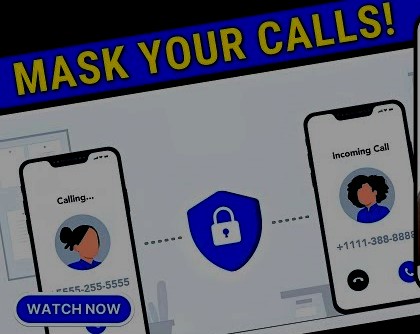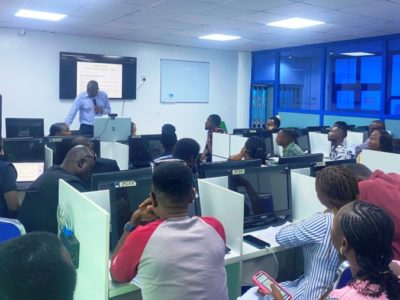Matters eRising with Olusegun Oruame
The Hidden Threat Undermining Nigeria’s Digital Economy: How Call Masking Fuels Fraud, Revenue Loss, and National Insecurity.
A Silent Saboteur in Nigeria’s Digital Growth Story
Nigeria’s digital economy—one of Africa’s most vibrant and promising—faces a silent but destructive threat: call masking. This fraudulent telecom practice, where international calls are disguised as local ones, continues to drain billions from network operators, weaken government revenues, and expose the nation to grave security vulnerabilities. Everyone losers except the phony operators.
RELATED: Call Masking resurfaces again in telecom networks
At first glance, the issue seems trivial: a call appears with a local number, but it’s actually from abroad. To most Nigerians, this is just another phone call. Yet, beneath this everyday occurrence lies a sophisticated scheme exploiting loopholes in Nigeria’s telecommunications infrastructure—and undermining the very foundation of trust in the digital economy.
ALSO READ: Much ado about Call masking and Call refilling – NCC’s “Ogboju” and Non-neutrality
ALSO RELATED: REJOINDER: Much ado about call masking and call refilling
At its core, call masking is the concealment or falsification of the origin of a call. Fraudsters intercept international calls, reroute them through SIM boxes—devices loaded with multiple local SIM cards—and re-originate them as local calls. Call masking and who are its perpetrators was a major industry issue in Nigeria in 2018. In 2025, it’s back and no less confounding.
This deceptive rerouting bypasses international termination rates, allowing fraudsters to pocket the price difference between international and domestic call charges. It is fraud build on genuine operators’ investment. According to the International Telecommunication Union (ITU), this practice—also known as call re-filing or CLI spoofing—is a global concern that distorts telecom revenues and jeopardizes network integrity.
How Call Masking Works: Inside the Fraud Chain
- Interception: International calls are intercepted using Voice over Internet Protocol (VoIP) technology.
- Routing: The calls are routed through SIM boxes filled with cheap or illegally obtained SIM cards.
- Re-origination: The call appears on the recipient’s device as a local number.
- Exploitation: Fraudsters profit from the lower local termination rate while legitimate operators lose out on revenue.
In 2018 alone, the Nigerian Communications Commission (NCC) estimated that operators were losing N2.5 million minutes daily to call masking and SIM boxing—a staggering blow to the sector’s financial health.
Impact on Nigeria’s Telecom Operators and the Digital Economy
The implications of call masking go far beyond lost airtime revenue. Its effects ripple through the entire digital economy:
- Massive Revenue Leakage: Telecom operators lose significant income from international termination fees, impacting their ability to invest in infrastructure, network upgrades, and service innovation.
- Poor Quality of Service: Calls routed through SIM boxes often experience delays, echo, or dropped connections—eroding consumer trust and brand reputation.
- Network Congestion: Illegally routed traffic overloads local infrastructure, degrading the quality of service for legitimate users.
- Customer Erosion: Frustrated by poor connectivity and fraudulent experiences, customers often abandon affected networks, further impacting competition and growth.
In a digital economy increasingly dependent on telecom reliability—for fintech, e-commerce, telemedicine, and e-governance—these disruptions slow down progress and investor confidence.
The Regulator’s Burden: NCC’s Ongoing Battle Against Telecom Fraud
The Nigerian Communications Commission (NCC) has long been at the forefront of the fight against call masking. Its efforts span technological interventions, policy reforms, and enforcement actions to curb the menace.
Key measures include:
- Sanctions on Complicit Operators: The NCC has fined and, in some cases, suspended licenses of entities found engaging in call masking and call re-filing.
- Stronger SIM Registration Framework: To cut off the supply of fraudulently obtained SIMs used in SIM boxing.
- Deployment of Advanced Detection Tools: The Commission has introduced real-time monitoring and call verification technologies to trace masked calls.
- Stakeholder Collaboration: Partnering with law enforcement, customs, and international regulators to detect and dismantle illegal operations.
- Consumer Awareness Campaigns: Nigerians are now urged to report suspicious or masked calls to the NCC’s toll-free number (622).
Despite these interventions, the practice has resurfaced, fueled by new technologies, organized fraud networks, and weak international coordination on telecom regulation.
The National Security Dimension
Beyond economics, call masking poses an existential threat to national security. By concealing identities and locations, masked calls provide a communication channel for criminal and terrorist groups. Intelligence agencies warn that such anonymity aids Boko Haram, fraud rings, and kidnapping syndicates, making detection and prevention difficult.
Additionally, call masking has been linked to voice phishing (vishing) scams, where fraudsters impersonate banks or government agencies to extract sensitive data from unsuspecting citizens. The consequences include identity theft, financial loss, and erosion of trust in digital financial systems.
Why Call Masking Matters for Nigeria’s Digital Future
Nigeria’s push for a $1 trillion digital economy by 2030 depends on a secure and transparent telecommunications backbone. Call masking disrupts this ambition by:
- Undermining the credibility of digital transactions and financial inclusion efforts.
- Weakening investor confidence in Nigeria’s telecom sector.
- Reducing tax revenue available for public digital infrastructure.
- Exposing vulnerabilities in cybersecurity and data protection frameworks.
As Nigeria integrates more deeply into the African Continental Free Trade Area (AfCFTA) and expands digital cross-border services, unchecked telecom fraud like call masking could derail economic diversification efforts.
The Way Forward: Strengthening Collaboration and Technology
Experts advocate a multi-pronged strategy to combat call masking effectively:
- Advanced Analytics and AI Detection Systems: Using artificial intelligence to detect anomalies in call routing patterns.
- Cross-Border Regulatory Cooperation: Partnering with neighboring countries to monitor VoIP traffic and SIM box operations.
- Enhanced Legal Enforcement: Imposing stronger penalties on offenders to deter recurrence.
- Consumer Education: Empowering users to identify and report suspicious numbers.
Protecting Trust in Nigeria’s Telecom Ecosystem
Call masking may seem like a technical fraud, but its implications are deeply human. It robs the economy, weakens security, and undermines trust. To sustain its digital transformation and global competitiveness, Nigeria must intensify efforts to secure its telecom infrastructure and protect consumers from invisible digital threats.
In an era where connectivity powers prosperity, Nigeria’s fight against call masking is, ultimately, a fight for its digital future.





























